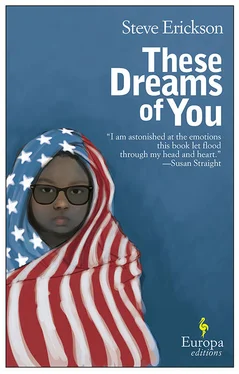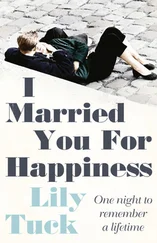Zan never has picked a political argument with a stranger before. Actually he doesn’t pick political arguments with anyone; he’s so averse to confrontation that when people talk politics, he’s as likely to sink into even greater silences. It’s hard to tell what age the woman is. She could be an older-looking thirty-eight or a younger-looking fifty-one. She looks older than Viv, who looks ten years younger than she is.
The woman is wearing a new ring that she’s shown off to the flight attendants. Zan decides she’s just gotten engaged — maybe, to put it cruelly, in the nick of time. He isn’t sure what leads the woman to draw conclusions about Zan’s political views, which are less predictable than the woman assumes; maybe it’s something she’s seen Zan reading on his laptop. Later he’ll wonder — though this might be unfair — if she saw Zan with his black daughter. In any case she immediately means to straighten him out on some things. After some back and forth that Zan wants no part of, she blurts, “The big difference between us is that I believe in personal responsibility and you don’t.”
He says in disbelief, “I don’t?” He looks back to his wife’s seat to see if she’s catching any of this, but Viv sleeps. Zan doesn’t understand Viv’s sleeping habits, how the slightest thing at home keeps her awake but she can sleep upright on a plane in a seat smaller than a coffin. “No,” the woman says emphatically, and Zan, visions of foreclosure in his head, wonders if she’s right. But she doesn’t know me, he thinks, doesn’t know my life; in fact — and there it is right on the edge of his brain — if she’s just getting engaged then in all likelihood she doesn’t have kids, and he hears himself snarling at her, “Do you even have kids? and if you don’t, then you have no clue what responsibility is.” Finally having gotten some guy to give her a ring, her chance of having children now, at either thirty-eight or fifty-one, is as far from her as the ground below them is now; and she looks stricken, her sense of power suddenly shattered, and bursts into tears. .
Except she doesn’t, “because,” Zan later relates to Viv, “I didn’t say that. It was there on the edge of my brain and there it stayed, because as much as I would have liked to let her have it, with her I’m-all-about-personal-responsibility-and-you-aren’t, as much as she asked for it, as much as she deserved it—”
“—you couldn’t bring yourself to,” says Viv.
He knows it’s the way a woman can be most profoundly hurt, “and maybe that’s my fucking problem,” he mutters, more to himself, maybe it’s the problem with all of us (whoever we are) when it comes to dealing with them (whoever. .), a softness, no killer instinct, mush for fortitude. “She didn’t have any problem telling me I have no sense of responsibility.”
“I know,” Viv says, and takes his hand.
The flight is half an hour late into London, eating into Viv’s connection time that’s precious to begin with. In the midst of the mindboggling bazaar of Heathrow’s duty-free shops, Viv has only the time to say, “I’ll email,” then, “I’ll call,” then she and Zan seem to realize they’ve no idea when they’ll next see each other and have spent most of what time there was bickering.
Viv grabs the kids goodbye then kisses Zan, and “O.K.” is all he can say. Shaking off the Benadryl stupor, Sheba begins to wail and Viv is slightly stricken. “It will be O.K.,” Zan says to Viv as he scoops up Sheba, nodding in a way that means, Go. Both will remember how quickly all this happened.
In her usual manner, Sheba begins making her presence known to London as soon as she, Zan and Parker are in the car that’s been arranged to take them from the airport. “I WANT MAMA!” she screams, and the driver jumps in his seat, eyes filling the rearview mirror. “How long is Viv going to be gone?” asks Parker.
Zan says, “A few days,” and turns his gaze outside in a way meant to preclude further explanation. It’s been more than twenty-five years since Zan last was in London, and as has become true with so many things, it doesn’t seem so long ago at all, and even as it doesn’t seem so long ago, it seems another lifetime, before Sheba, before Parker, before Viv. At the time he just had finished what would become his first published novel and still was more than a year from selling it and nearly three years from publication. Turning in the backseat of the car and craning his neck to take in this and that, he realizes he’s seeing less what he’s looking at than whatever memory it marks in some mental almanac that’s already begun to crumble.
The driver of the car clears his throat and ventures into something that Zan guesses he’s been considering since Heathrow. “Well done, then,” he says, “you Yanks.”
“Sorry?” says Zan.
“Well done,” the driver nods in the rearview mirror, a tentative smile, “the new top man. You did it!”
Zan looks at Parker, and Parker looks back at his father and shrugs. It’s a few seconds before Zan understands; everyone wants to talk politics these days. I should introduce this guy to the woman who harangued me on the plane, he thinks. See how “well done” she thinks it is. “Oh,” Zan says, “yeah, it’s. . kind of unbelievable, really.”
“Think he’ll turn it all around, then?” says the driver.
“Everyone hopes so. Almost everyone, anyway.” Zan realizes that, seeing Sheba, the driver assumes he knows how Zan voted: Is this cause for indignation? An assumption made solely on the basis of Sheba’s color? On the other hand, well, the assumption happens to be correct, if not the reasoning. “She was for the other guy,” Zan jokes to the rearview mirror, pointing at Sheba in his lap.
The driver laughs, maybe with some relief that he hasn’t given offense. After a pause he says, “Funny place, the States. Given the bloke you had before, I mean.”
“Yeah,” says Zan, “funny place.”
Politics, such as it is, doesn’t come up again until the car nears the hotel in Bloomsbury, where Zan and his children have been put up by the university. The driver has taken the long way to show off the city, turning south to come into London by way of Hammersmith, then cutting through St. John’s Wood to Regent’s Park where he slows and points to a distant, grand red-brick mansion with white columns. “Winfield House,” the driver says.
Zan says, “I don’t think that’s our hotel.”
The driver chortles. “Your ambassador lives there. Or used to,” he adds, suddenly a bit unsure.
“Really,” Zan says with all the enthusiasm that politeness can muster. He looks at his kids to get a more accurate reading of just how boring this is; Parker’s expression confirms that it’s somewhere around Def-Con Two. Sheba has fallen asleep again. The inventor of Benadryl, Zan thinks, should get the Nobel Peace Prize. “I heard your President Kennedy lived there, didn’t he?” says the driver. “That’s what someone told me.”
Zan realizes the driver might be correct. “I believe so. As a boy.”
The driver does a double-take. “He was ambassador as a boy?”
“No, of course not. He wasn’t ambassador, his father was ambassador.”
The driver gazes at the red mansion. “They say the new man is like him, then?”
“Who?”
“President Kennedy?”
“Uh,” Zan shrugs, “maybe.” He says, “The campaign was more like his brother’s.”
“Was he the one shot?” Parker says.
“Both of them were shot.”
Читать дальше











